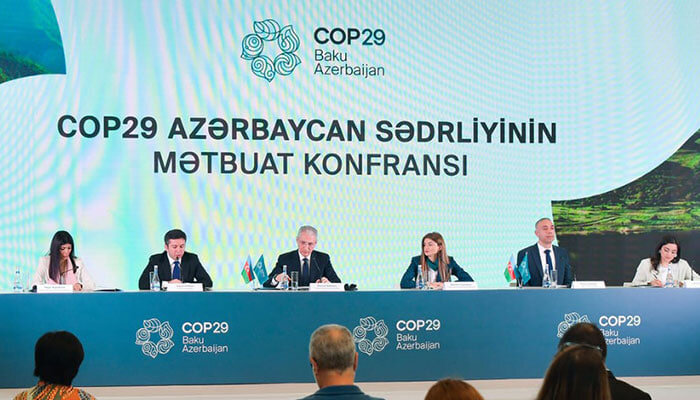Was COP29 in Azerbaijan a failure?

COP29 traversed a rocky path from the moment UN officials selected petrostate Azerbaijan as the host nation. The conference ended in overtime on November 24 with only modest climate finance goals, failed to deliver on an expected announcement of a new commitment to cut greenhouse gas emissions, and displayed unusually high tensions among nations, spurred in part by statements from the host, Azerbaijani President Ilham Aliyev, that oil and gas was a “gift from God.” The result was deep concern among climate policy activists for the future of climate diplomacy.
This was known as the ‘finance COP.’ What new commitments were accomplished?
At COP29, intense negotiations over the New Collective Quantified Goal (NCQG) on climate finance stretched beyond the final hours, yet again illustrating the eleventh-hour deal-making that has become a hallmark of COP summits. At COP26, it was the “phasing down” of coal; at COP28, language on fossil fuels was born under similar pressure. At COP29, increasing commitments to climate finance was the most anticipated outcome.
The G77 bloc—developing countries plus China—had firmly demanded $1.3 trillion by 2035 from historic emitters such as the United States and European Union (EU) countries. One economic study released during COP29 estimated the actual need for funding is $6.3–6.7 trillion per year by 2030, with developing countries alone requiring $2.3–2.5 trillion. But developed nations balked.
The UN climate summit in Baku, Azerbaijan, was poorly organized, fell far short of goals for climate finance, and raised doubts about the ability of the COP process to halt alarming global warming trends.The final NCQG text includes a goal to mobilize $300 billion annually by 2035 for developing countries. The text calls for the funding to come from “a wide range of sources and instruments including public, private and innovative sources, from bilateral and multilateral channels.” The agreement also calls on nations to work toward reaching a $1.3 trillion climate financing goal by 2035. While the new goal represents a tripling of the previous commitment, it falls drastically short of meeting the accelerating need, a deficit that both civil society groups and delegates from developing nations condemned. Some nations, including India and Nigeria, accused Azerbaijani leadership of improperly forcing a deal at the last minute.
Given the tardiness of the developed nations in meeting prior financial commitments, questions remain as to whether the promise of $300 billion will be fulfilled. As UN Framework Convention on Climate Change (UNFCCC) chief Simon Stiell remarked at COP29’s closing, the new financial goal—like any insurance policy—only works “if premiums are paid in full, and on time. Promises must be kept, to protect billions of lives.”
Were there any notable signs of progress?
COP29 resulted in a mixed bag of accomplishments and setbacks on critical issues.
Operationalizing carbon markets. On the first day of COP29, Baku’s leadership brought a close to an issue that had suffered deadlock in prior COPs: the establishment of rules for global carbon market pursuant to Article 6 of the Paris Agreement. Nations were presented with the choice of either accepting or rejecting an operational framework for country-to-country carbon trading and crediting mechanism. Azerbaijan’s Minister of Energy Parviz Shahbazov hailed the adoption as a game-changing tool for directing finance to the developing world, but delegates from the Pacific Island nation of Tuvalu and civil society groups complained of the hasty adoption, questioning the abandonment of process and the potential for unintended harm. While nations acceded, the heavy-handed maneuver by Baku’s leadership quickly became known as the “carbon coup.” The agreement marks the finalization of all remaining parts of the Paris Agreement—a decade after it was agreed to.
Increasing global energy storage. Countries with large energy markets, including the United States, Brazil, Saudi Arabia, the United Arab Emirates (UAE), and the United Kingdom (UK) backed the COP presidency’s ambitious energy storage pledge targeting a sixfold increase to global capacity by 2030. The talks also strengthened a commitment to improved grid security and green energy transmission pathways, and the COP29 presidency announced a hydrogen declaration that commits to scaling up renewable, zero-emissions, and low-carbon hydrogen and decarbonizing existing unabated production. A group of twenty-five countries and the EU announced that they would include a pledge for “no new unabated coal power” in their next round of commitments.
Mobilizing adaptation funds. Similarly, results varied when it came to tangible contributions to existing funds. Australia and Sweden pledged $50 million AUD ($32 million USD) and 200 million Kronor ($19 million USD), respectively, to the loss and damage fund announced at COP28. But the UN Adaptation Fund—a two-decade cornerstone of resilience-building against extreme weather and rising seas—secured a mere $61 million against its $300 million annual target.
Failure to address fossil fuel production. At last year’s COP in Dubai, UAE, nations reached a historic first in climate negotiations. They included in their final text—to which all nations agreed—a call for a “transition away” from fossil fuels. At this year’s COP, that unanimity began to crumble with Saudi Arabia’s refusal to accept any text “targeting specific sectors, including fossil fuels.” COP29 ultimately failed to reach an agreement on how to follow up on fossil fuels, pushing the decision to next year’s COP30 in Brazil.
Under the Paris Agreement, nations are to present new voluntary commitments to reduce heat-trapping gases by February 2025. The commitments previewed at COP29 varied significantly in ambition. While the UK raised its emission reduction targets significantly, the submissions from Brazil and the UAE came under criticism for not addressing the phasing out of fossil fuels, a commitment made last year at COP28.
Alice C. Hill is the David M. Rubenstein senior fellow for energy and the environment at the Council on Foreign Relations. Priyanka Mahat is a CFR research associate for climate change policy.
Leave a Comment